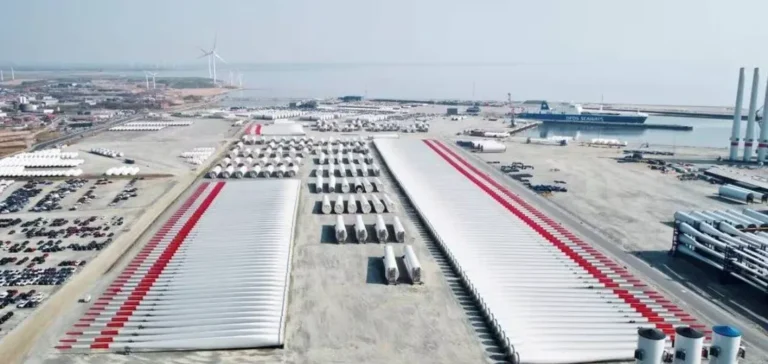Industrial group Siemens Gamesa has suspended construction of an offshore wind turbine nacelle plant planned at the Port of Esbjerg in Denmark. The project, approved in 2024, was set to receive DKr375mn ($58.3mn) in public support and initially produce 150 units annually, scaling up to 250 turbines. No timeline has been given for potential resumption of the project.
A market context unfavourable to heavy investment
The company justified the suspension by citing a lack of clarity in market outlook, stating that any new investment decision now requires greater industry stability. Siemens Gamesa, which has had a long-standing presence in Esbjerg, still views the port as a strategic site for offshore operations but remains cautious on further financial commitments.
The pause comes amid growing uncertainty across the European offshore wind market. Vestas, another major manufacturer, recently halted plans for a blade plant in Poland, citing lower-than-expected demand. These back-to-back delays illustrate a slowdown in industrial expansion by Europe’s two leading wind turbine makers.
Esbjerg, a logistics hub under pressure
The Port of Esbjerg is a key logistics centre for offshore wind. However, Jesper Bank, Chief Commercial Officer of the port, expressed concern about the low volume of tenders. According to him, the irregularity of auctions is producing more losers than winners, discouraging industrial investment.
The suspension of Siemens Gamesa’s project deepens this trend. Industrialisation delays are weakening the manufacturing and logistics value chain. Equipment manufacturers are becoming increasingly cautious amid policy uncertainty and rising supply chain costs.
Industry leaders call for durable commitments
Jan Hylleberg, Deputy CEO of Green Power Denmark, said the investment freeze reflects a broader slowdown in electrification across Europe. He noted that the sector must now adapt to a slower-than-anticipated pace of infrastructure development.
Troels Ranis, Director at industry organisation DI Energy, stated that the Esbjerg project has not been cancelled, but remains on hold due to a lack of visibility over future projects. He stressed the need for a solid, long-term pipeline to enable manufacturers to plan capacity increases.
European ambitions under strain
Outlook for offshore wind in Europe has become increasingly uncertain, with scaled-back national targets, project cancellations and failed auctions. Consultancy Rystad Energy has revised its 2030 capacity forecast down from 109GW to 87GW.
Analysts have highlighted that clear and stable regulatory frameworks will be essential to rebuild investor confidence. In the absence of strong political signals and a reliable volume of secured projects, industrial investments in offshore wind remain stalled.






















